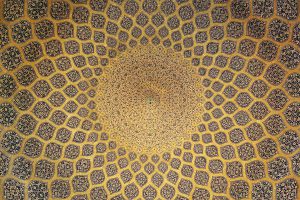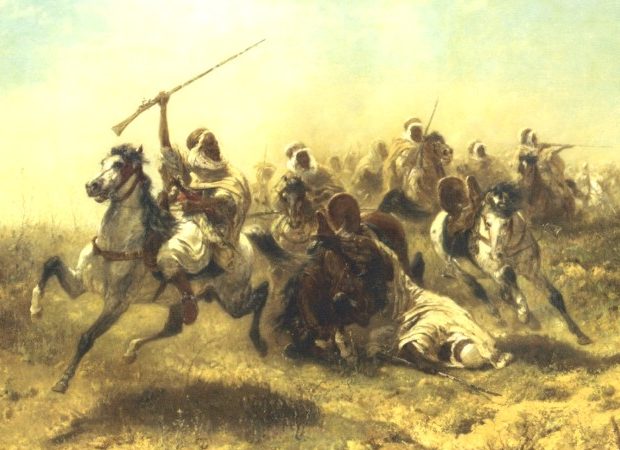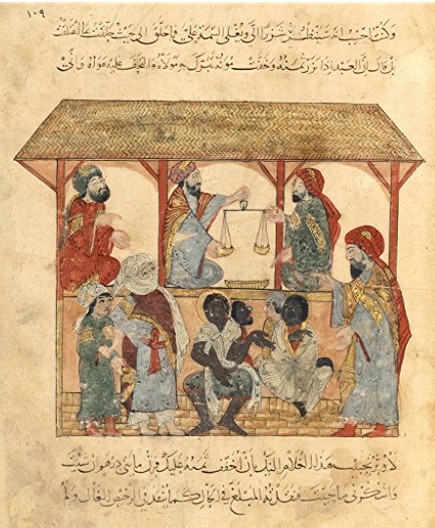
Some highly stubborn psychopathic neurotic symptoms have afflicted the moral values of Muslims with death, and these are a set of assumptions whose truth is not evidenced in reality, but rather negated and contradicted by it. The assumptions are based upon something akin to a religious belief, which is that of all the celestial and earthly religions on the globe Islam is specifically the true expression of moral values, and that a non-Muslim is necessarily someone without morals, for the mere fact that he is a non-Muslim.
THE MUSLIM’S PROBLEM with values is a highly complex one, since he bases his values on religious beliefs, and believes that his faith alone possesses the perfect morals that necessarily accompany the perfection of knowledge. And that is precisely what makes him assume that a non-Muslim necessarily cannot possess sound knowledge, and perforce does not possess a sound morality. This removal of moral values from the enemy has been, and still is, an effective weapon of psychological warfare for enlisting those who think themselves as righteous and pure in opposition to those who are evil. The sullying and devaluing of others is carried out first and foremost in order to keep one’s conscience clear when slaughtering this ‘other’ according to the doctrine of jihad, as one who deserves his fate, thus justifying waging war against him, fighting him and slaying him.
It is precisely for these reasons, and based on these beliefs in particular, that the Islamic wars of strife and the wars of conquests took place, wars which claimed the lives of millions of Muslims and non-Muslims – about a million and a half people during the first four years of the conquests outside the Arabian peninsula, at a time when a million constituted a vast number in terms of the societies of the time.
The sullying and devaluing of others is carried out in order to keep one’s conscience clear when slaughtering this ‘other’
These wars were based on the belief that Muslims possessed the final truth in how religion and the world were to be understood, and later during the wars of civil strife, how each Muslim sect possessed the complete truth, that it alone had moral values, in contrast to the opposing sect in the same belief which believed in other values based on a different understanding of Islam.
These were subjective values which were based on emotions and which did not, in point of fact, hold to any specific criterion that could evaluate them positively or negatively. And this is despite the fact that the world at that time had indeed elaborated objective (axiological) values ever since the time of the Greek philosophers, centuries before the emergence of Islam. These philosophers subordinated themselves to three absolute and undisputed objective values that everyone clearly understood: the True, the Good and the Beautiful. But Islam emerged neither in Athens nor in Rome, but in the Hijaz, and addressed people of the harsh deserts, in their language, with their understanding, knowledge and values, and not with the knowledge and values of non-Arabs.
Their subjective values were natural to the culture of the Arab in the early pre-Islamic era, because if he applied altruistic values such as generosity and benevolence, he would soon die of starvation in his deserts. So the Arab tribes moved in the wildernesses in search of their own avaricious interests, for which they fought a zero-sum combat. In this contest there could be no room for reconciliation or peace initiatives, it was a kill-or-be-killed contest, the tribe slaughtering as many of the defeated tribe as it could, seizing all its wells, cattle and belongings that it owned, leaving alive only those it could make use of. And since it was a mouth to feed there had to be something necessary that would justify leaving them alive – otherwise it were best if they perished.
It is for this reason that slavery was a pillar of Bedouin society right from the dawn of its history. Egypt, on the other hand, in all its history only knew the system of slavery when the Jewish bedouins entered it at the time of Prophet Joseph and the Hyksos. The Arabs never rose to embracing values such as generosity, keeping one’s word, or speaking honestly until the establishment of a citizenry at Makka, which turned into a centre of commerce and transit. It then seized the reins of world trade during the seventy-year wars between the empires of Persia and the Romans, and it was the interests of trade, and the requirements of freedom of movement and safety that could benefit everyone, that imposed upon the Arabs a need to agree on values of brotherhood, chivalry and honesty, on mutual assistance, trade, generosity, and the keeping to agreements.
The Arabs never rose to embracing values such as generosity, keeping one’s word, or speaking honestly until the establishment of a citizenry at Makka
All this came about specifically during the second pre-Islamic era, the source of all the virtues of the Arabs, which came to an end with the emergence of Islam and the reversion of the Arabs to the values of the early pre-Islamic era, where the values were values of raiding, plundering, capturing slaves, and zero-sum wars.
The Islamic wars of internecine strife were due to the belief of each party in their absolute righteousness, for which they waged a zero-sum war against the other. This total war was a complete annihilation in the full sense of the word, with the total destruction of families such as – in what is the most shameful example from our history – the extermination of the family of the Prophet, even the suckling infants. It was a culture that ate the house of its founder and revealed itself in the wars of conquest, where entire realms were annihilated, such as the Ghassanid and Mundhirid kingdoms which vanished from geography and history. And these, it should be said, were Arab kingdoms, they were not Persians nor Romans.

Suggested Reading
The war of the Arab is all or nothing, from the river to the sea, even if thereby all were to perish, since he does not see the other at all, for this other has no right to life. This last was a concept that did not exist in the seventh century AD in bedouin societies, peoples who knew neither the laws of Rome, nor the philosophy of Greek morals, nor the democracy of Athens. They have not existed in our lands right up to today, because we are still living in the seventh century AD, and we have turned our country into racist, sectarian, feuding tribalisms, loyally living in the same place and the same time as ‘the best of ages’.
But the values of that era are values that need to be reviewed carefully and extensively, because they are steering the behavior and the actions of Muslims today, and underpin his mindset and goals. We need to examine the extent of the impact of these values, whether positive or negative, for the process of deconstruction and rebuilding necessary for the long-awaited reform.
Ancient Egypt became a stable and coherent civilized country more than seven thousand years ago, yet there was no Kaʽba there, no domes sacred to the Prophet’s family, and no ‘Islam as the solution’. Nor did any of those internecine struggles take place between its people: Egypt in ancient times never saw a single civil war.
Here is the cultural difference that an environment of mankind living side by side brings about, and which highlights the difference between the values of the sedentary peoples and the values of the nomadic bedouin. An example of this on the one hand is Iraq – from whose name the Arabic tongue derives the term ‘irāqa, (‘deep-rootedness’) – and on the other hand the true Tatar, takfīrī invasion, one that hails from Saudi Arabia, Egypt, Iran, Syria, Algeria and Yemen. After the fall of the tyrant, each pretender came with his fatwā, each transforming an opinion into a sacred text. Thus fatwās were sanctified to the extent of licensing the blood of anyone who refused to accept them, as thereby constituting one of the ‘unbelievers’.

Suggested Reading
In the Sunna of the Prophet there were issues that persons could avoid accepting without being made a sinner. But the jurists of a later age now come to us with fatwās that are unimpeachable as to their certainty, evidence and validity – without their having to demonstrate the source of their sanctity, which stands above Jibra’īl, the bringer of the Revelation, or the Messenger of God! These fatwās go so far as to take away a person’s life, something that God had prohibited without there being a true justification. They do this since they see that the Truth lies with them alone.
What will become entrenched in the mind of the young child when he learns and memorizes verses that say:
Hast thou observed him who belieth religion? That is he who repelleth the orphan, And urgeth not the feeding of the needy.[1]
The meaning of religion in Islam is Islam alone, and those who do not believe in this religion are ‘the harsh, ruthless souls’. They abandon the orphan, but in addition to their hardness of heart they are evil, for are not satisfied with merely abandoning the orphan, they do not give any advice or guidance on how to feed the orphan.
It highlights the difference between the values of the sedentary peoples and the values of the nomadic bedouin
Any understanding of these verses is removed from their historical or objective context in time or place in the world at the time of the call. Theirs is a cursory and superficial understanding, and no Muslim today – confronted with the huge Islamic library in quantity and quality – has either the time or the means to search for that context. He needs a simple and useful summary, one repeated by the jurists so that the common folk will believe it: that is that a non-Muslim is one who has not morals nor humanity.
Rather, it is axiomatic for those who declare themselves to be Muslim, that they consequently, and necessarily, possess high moral values. Did you not see how ‘Abd al-Munʽim Abū al-Futūḥ, the well-known Muslim Brotherhood leader, in an interview on Islam Online, asked in amazement and outrage:
How can one imagine a Muslim – who calls for honesty and trustworthiness in others – showing in his behaviour and actions an image that is anything but honesty and trustworthiness?
In like fashion Shaykh Qaraḍāwī told us about Muslim society:
That society is founded upon some special manners and customs which make it one of a kind, something that does not imitate others who are far removed from it in time or place. [2]
And in his work Al-Ikhwān al-Muslimūn (‘The Muslim Brotherhood’) he states, quoting his master Ḥasan al-Bannā’ in describing non-Muslim societies:
Among the most important phenomena haunting civilization are atheism, doubt in God, denial of the soul, forgetting the rewards of the Afterlife, permissiveness, the rush for pleasures, sophistication in pleasure-seeking, the unbridling of one’s instincts and egotism. Everyone wants nothing but the best for himself. There is also usury, which they consider legitimate and a basis for dealings. These materialist manifestations have produced in European society the corruption of souls, a weakness of morals, and indolence towards the combatting of crime Problems have thus multiplied and destructive principles emerged, and modern civilization has proved to be complete unable to make human society safe … and has failed to make people happy. [3]
Al-Qaradāwī has repeated this as an assumed postulate in most of his books. For instance, in his work Features of the Muslim Society We Seek, he states:
The Muslim society is distinguished from all other societies by its components and characteristics. It is a divine, humane, moral and balanced society, and Muslims are required to establish this society so that they can establish their religion in it and embody their personality in it, and live in its shade an integrated Islamic life, a life that is governed by the Islamic faith, purified by Islamic worship, guided by its concepts and supported by Islamic morals. It is one where Islamic values are dominant, one which is safeguarded by Islamic laws, and one whose economy, arts and politics are steered by Islamic teachings. [4]
[1] Qur’ān CVII (Al-Maʽūn), 1-3.
[2] Y. Qaraḍāwī, ملامح المجتمع المسلم الذي ننشده (‘Features of the Muslim Society We Seek’), Maktabat al-Wahba, 2001, p.109.
[3] Y. Qaraḍāwī, الإخوان المسلمون , pp.139-140.
[4] Y. Qaraḍāwī,, ملامح المجتمع المسلم الذي ننشده , p.7.


